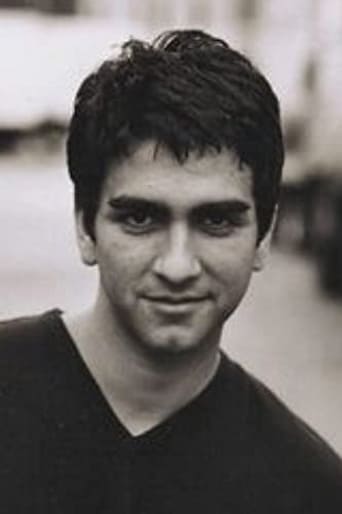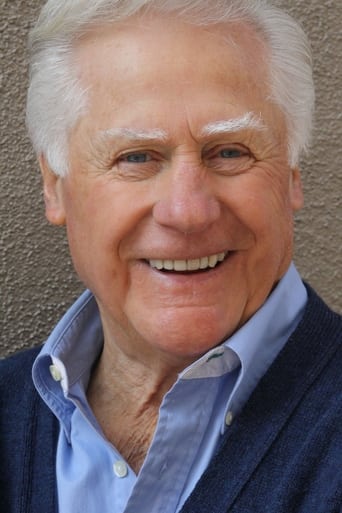VividSimon
Simply Perfect
RipDelight
This is a tender, generous movie that likes its characters and presents them as real people, full of flaws and strengths.
Glimmerubro
It is not deep, but it is fun to watch. It does have a bit more of an edge to it than other similar films.
Jonah Abbott
There's no way I can possibly love it entirely but I just think its ridiculously bad, but enjoyable at the same time.
petrelet
The original title of this review called it an "existential parable" but that would really be too much like putting the spoiler in the subject line. I don't mean that this seems to have an existential viewpoint. I mean that the writer/director, Ramin Bahrani, gave an interview in which he said that he was inspired by how the cart vendors of New York reminded him of the myth of Sisyphus. So there are no mysteries here. We see it too, as we see Ahmad Razvi push this huge heavy coffee- and-bagel cart the size of a minivan up and down the streets before down. The cart seems larger and heavier and more impossible to manage each time we see it. The sign on the cart always says the same thing: "Have a Nice Day." This sign is meant to be read by the customers, I suppose, not by the vendor.Ahmad Razvi is the actor, but the character is also named Ahmad, and in fact Razvi was not an actor, he was a guy Bahrani met who until recently had been pushing these carts around himself. Ahmad (the character) had a life in Pakistan as a singer. He no longer has it. In New York he had a wife and son. We see one happy moment in flashback. Now his wife is dead, and his son is living with his in- laws; his mother-in-law hates him and blames him for everything. He meets a successful Pakistani guy who might be helpful to him, and a young woman from Spain running a news shack who kind of likes him, it seems. But it's not wise to get too attached to anything in the world of Sisyphus. Not even the stone, er, cart.Well, now you sort of know the plot, if that's the term. And, putting it down like this, it might seem rather poignant, not to say depressing. And I can't say this movie is for everyone at any time. Honestly, more than once I was really hoping to see some little providential cliché that would solve Ahmad's problems, but the film never took that kind of easy pity on us.But on the other hand if your heart is open to it you come away from it with a feeling of having been washed free of attachment by a drenching rain. What, you want a movie with triumphs in it? There are no triumphs. We all lose everything ultimately. We don't take anything with us. The boulder always rolls back down over us sooner or later.So what choice do we have, except how we are going to conduct ourselves? After everything has happened to you that can happen, suppose that a guy comes up to you and asks for a coffee and a bagel. Will you give him good service? Will you smile at him from your heart? Will you wish him a nice day? Without irony, without envy? I think this is the question the film asks us. If you can do that, isn't that a triumph? Mightn't this actually be inspiring? Isn't this the way we can actually spit in Sightblinder's eye on the last day (to borrow from Robert Jordan)? That's what I thought, anyway.
tieman64
Ramin Bahrani writes and directs "Man Push Cart", the story of Ahmad Razvi, a young Pakistani-American street vendor who wakes up at 3am every morning to collect his thousand pound steel cart and drag it to a sales point in Manhattan. From this cart, Ahmad sells coffee, tea, muffins and bagels, though on the side he also sells bootlegged DVDs.The film is a modern day Sisyphus tale, Ahmad, like a figure torn from the annals of Greek mythology, condemned to a life of endless and futile labour. When he's not chained to his cart, heaving its massive bulk through the busy streets of New York, Ahmad tends to an abandoned kitten, longs to see his son (who hardly remembers him and who lives with his maternal grandparents), mourns the death of his wife and frets over not being able to instigate a romantic relationship, let alone communicate, with a beautiful Spanish girl who works at a newsstand.There are shades of early De Sisca, Visconti and Rossellini, "Man Push Cart" playing like a scrumptiously digital take on early neorealist films. Beyond this the film works well on at least three other levels, Bahrani serving up an affective tone-poem, and doing well to sustain an ambiance of affective despair. Precisely because he leaves out all references to the dangers that have dogged American Muslims and immigrants post 9/11, the film also has a certain political force, shining light on human faces many are quick to dismiss or deem alien. Mostly, though, the film works well as an exercise in existential minimalism. Ahmad's struggles are human and universal. Comparisons to Robert Bresson are therefore apt, though unlike Bresson's films, the absurdity, cruelty even, of Ahmad's travails never quite gets under your skin.8/10 – Though an excellent film, this is a slight, one note movie, which perhaps overly romanticises its cast and its eye-popping city lights. See "Wendy and Lucy" and "Land of Plenty". Worth one viewing.
MisterWhiplash
It's an interesting thing to watch a director's early-career chronology out of order. I saw Chop Shop, a film Ramin Bahrani made a couple of years ago about orphans living in a wasteland of mechanics and car repairs, and loved its realistic look and feel and its touching story told through non-professional actors playing characters in risky and dire circumstances. His previous film- his debut- Man Push Cart, also has a realistic viewpoint, a sense of artistry with its cinematography but not so much as to lose the no-melodrama sense of its character in the world and what (little) happens with/to him. I was perhaps expecting a similar grim intensity, when it's really more observant, less about giving its character Ahmad drama to face when he really has enough behind him that he just has to push that cart. Sometimes doing the daily grind is enough to wear one's spirits down to a nub. Maybe that's what it's 'about'.It's the simple saga of Ahmad, a Pakistani working at a food cart who we see continually, every early morning, push it around in order to sell food (bagels, coffee), and make friendships with another man, Mohammad, who recognizes Ahmad from his previous life in his native country as a singer, and Noemi, a Spanish girl who works at the newsstand. What makes Man Push Cart fascinating- if also quite depressing- is that it's protagonist is just a decent guy who has been dealt with some bad luck in his life (bad meaning loss of his early career, unable to see his son, and a dead wife), and a quiet reluctance to enter back into what he did before when asked by his new friend Mohammad who, as he says, "has connections". There's under-the-surface pain that the actor Ahmad Razvi conveys without having to force it. But we know there is pain, and heartbreak, and a desire to just make his meager living and go along with it.So what happens in the film? Not much, really, which may frustrate some viewers even when it is shot tastefully on the dark streets and under-lit bars and acted with some talent. Well, there is a sort of story in Ahmad bringing a little happiness in his life with a stray kitten, which is something joyous and saddening. There is also the not-quite relationship between him and Noemi, where they simply enjoy each others company without saying to each other too soon why they aren't closer (then again, Ahmad mentions part of his backstory, and Noemi knows right away). But a lot of the film is just about the nature of observing a life being lived, one not extraordinary but not too boring. It's not quite at the level of a 'neorealist' effort like Chop Shop, and yet I wouldn't put it past anyone making the comparison. Sometimes we watch movies to escape in fantasy lives and archetypes. Other times, if necessary, we can watch in curiosity and sad awe at an existence like Ahmad's. It's a touching little film.
Julia-3
To me, this film represents a new variety of the bad movies. So the 3 stars I give it are mostly for inventing a new genre. There are many bad movies out there but not similar to this one.From the very beginning, I could not understand if I was watching a documentary or a movie. For a documentary, it was lacking a voice-over. Plus, the supporting characters' behavior/motivation looked a bit too scripted/contrived. For a real movie, it lacked the plot and the dialog. For a real movie that is just so out there that it does not need either a plot or a dialog, it lacked that spark of life and originality that captures your imagination and keeps you glued to the screen until the end (and then you want more).We meet a Pakistani immigrant who used to be a popular singer in Lahore and who is now reduced to doing menial work in NYC in the name of, I suppose, the great American Dream. I say "I suppose" because we never find out exactly how he got here and what he wants in life (besides seeing his son). The House of Sand and Fog, Before Night Falls, Mississippi Masala, heck, even The Kite Runner did it before and did it better (and that list is not exhaustive).There are some good technical things about the movie. The monotony of his existence is represented very well by showing how he gets the cart ready every morning by lining up cups, taking out bagels, etc. Exactly the same sequence is shown twice - at the beginning of the movie (in his own cart) and at the end (in the friend's cart). But what happened in between does not qualify as full feature film. A technically excellent film school project, but very weak if reviewed otherwise.






